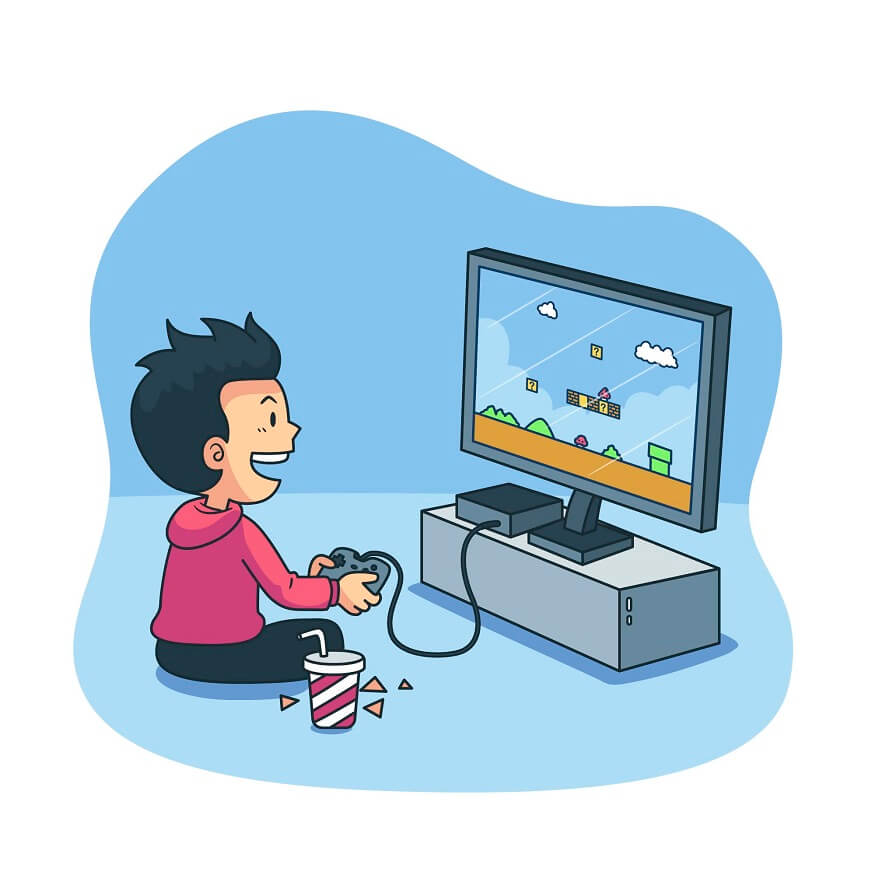In the quick-paced world of today, video games have emerged as a widespread and captivating type of kid entertainment. However, much as with other aspects of modern life, parents do worry about the potential impacts on their kids. The positive potential that video games may have, on the other hand, is acknowledged by some parents. We will explore the complex areas of child development and the numerous impacts that playing video games may have on a kid’s cognitive ability, physical health, social relationships, emotional resilience, and more. Understanding these impacts better will enable parents to make wise choices and create environments that support their children’s growth and overall development.
Positive Effects
- Cognitive Skills Enhancement
- Hand-Eye Coordination and Motor Skills
- Creativity and Imagination
- Teamwork and Collaboration
- Stress Relief and Relaxation
- Technology Proficiency
- Educational Value
- Problem-Solving Abilities
- Decision-Making Skills
The benefits of video games are to frequently feature difficult situations that demand players to use their critical thinking and problem-solving skills. Children who play these games are forced to consider all available options, plan, and act quickly. These cognitive skills honed through gaming can transfer to real-life situations, empowering children to handle challenges more effectively, whether it’s tackling academic problems or making decisions in their daily lives.
The advantages of video games are they demand precise hand-eye coordination and quick reflexes. As children manipulate controllers and respond to on-screen stimuli, their fine motor skills and reflex capabilities improve. These enhanced abilities can be beneficial in various activities, such as sports, playing musical instruments, and everyday tasks requiring precise coordination, contributing to a well-rounded skill set.
Certain video games, especially those with open-world exploration and sandbox features, encourage creativity and imaginative thinking in children. The freedom to build unique structures, create characters, or craft narratives within the virtual world allows children to express their artistic abilities and develop their storytelling skills. This creative expression nurtures their imagination, which plays a vital role in their overall cognitive development and fosters their ability to think outside the box.
In multiplayer video games, players frequently need to work together and successfully communicate with other team members. Building a sense of collaboration, cooperation, and communication skills while working towards a shared objective. Beyond gaming, these abilities can improve kids’ capacity for cooperative play, dispute resolution, and the development of close connections with their peers, laying the groundwork for future social interactions.
In moderation, the benefits of video games can serve as a healthy outlet for stress relief and relaxation in children. Engaging in gaming can help children unwind and de-stress after a busy day at school or during challenging times. The immersive nature of video games provides an escape from daily stressors, offering a safe space for children to unwind and recharge.
Growing up in a digital age, the benefits of video games can help children become more technologically proficient. Navigating game interfaces and using various controls can enhance their digital literacy, a valuable skill in today’s technology-driven society, preparing them for the digital challenges they may face in their educational and professional lives.
The advantages of video games are they are explicitly designed to be educational, offering opportunities for children to learn new concepts, languages, history, or problem-solving strategies. These games can complement formal education and make learning more engaging and enjoyable, turning education into an interactive and fun experience.
Complex problems that need original solutions are frequently presented in video games. As they solve puzzles and overcome hurdles, kids learn how to persevere and be resourceful when faced with challenges in real life, which helps them cultivate a “can-do” attitude is the advantages of video games.
Benefits of video games are they frequently offer players choices that impact the game’s outcome. Children must make decisions and assess the consequences of their actions, fostering their decision-making skills and teaching them to think critically before making choices, preparing them to make well-informed decisions in real-life situations.
Negative effects
- Sedentary Lifestyle
- Aggressive Behaviour
- Sleep Disturbances
- Academic Performance
- Social Isolation
- Loss of Sensitivity to Violence
- Impaired Social Skills
- Attention and Focus Issues
- Addiction and Dependency
A major drawback of video games is the risk of a sedentary lifestyle. Long hours spent sitting while gaming can result in insufficient physical activity, leading to health problems like obesity.
According to certain research, children’s aggressive behaviour and violent video games may be related. Overexposure to violent material might make kids less sensitive to real-world violence and encourage aggressive behaviour.
Playing video games late into the night can disrupt a child’s sleep pattern. The blue light emitted by screens can interfere with the production of melatonin, making it challenging for children to fall asleep and leading to sleep deprivation.
Excessive video game use can interfere with a child’s academic performance. Spending too much time gaming may lead to neglecting schoolwork, affecting grades and overall academic progress.
Even though certain multiplayer games encourage cooperation and effort, excessive gaming may also cause social isolation. Playing video games alone for extended periods of time may prevent kids from making significant real-world friends.
Frequent exposure to violence in video games can lead to desensitisation, causing children to lose their empathy and sensitivity towards real-world violence.
Excessive immersion in virtual environments may hinder the development of essential social skills, like understanding emotions and nonverbal cues, which are better acquired through face-to-face interactions.
Overindulgence in video games can lead to attention and focus issues, making it difficult for children to concentrate on other tasks like schoolwork and chores.
For some children, drawbacks of video games can become addictive, leading to dependency and an unhealthy preoccupation that may interfere with other aspects of their lives.
Achieving a healthy balance in children’s video game usage requires the following strategies:
- Time Limits: Set clear guidelines for daily gaming, ensuring they have time for other activities.
- Age-Appropriate Content: Choose games suitable for their age and maturity, avoiding violent or inappropriate content.
- Diverse Activities: Encourage participation in various activities, like exercise, creativity, and social interactions, for a well-rounded life.
- Parental Involvement: Stay engaged in their gaming experiences, understand the games, and discuss their choices to guide them better.
Conclusion
Depending on the sort of game played, how long it is played for, and the player’s personality, video games can have advantages and disadvantages for kids. To maximise advantages while lowering risks, the correct balance must be found. Children will benefit best from digital experiences if a well-rounded approach is encouraged that incorporates educational, social, and physical activities. As responsible caregivers, understanding the effects of video games and actively engaging in their gaming experiences fosters a harmonious blend between virtual entertainment and real-life development. Proper guidance and supervision enable benefits of video games to enhance cognitive abilities, creativity, and social skills while curbing any negative effects of excessive gaming. By being mindful of game content and playtime, parents empower their children to embrace the positives of gaming within a balanced and healthy lifestyle. This equilibrium allows children to thrive in both their virtual and real-world experiences.
Euroschool understands the importance of discussing how video games affect children’s development. Positively, video games can improve cognitive skills, hand-eye coordination, creativity, and teamwork. As an educational institution, Euroschool emphasises the importance of balance and responsible gaming. By fostering open communication with parents and caregivers, we aim to help children develop healthy gaming habits while encouraging a well-rounded lifestyle that includes physical activities, educational pursuits, and meaningful social interactions.











